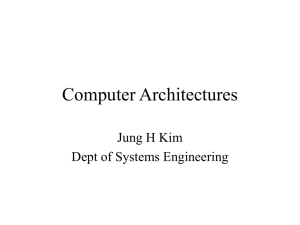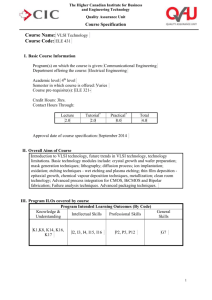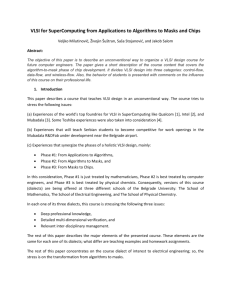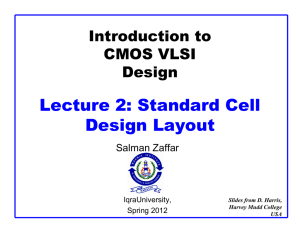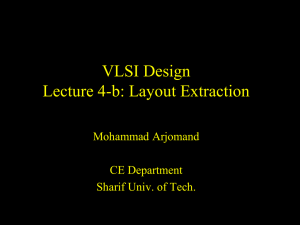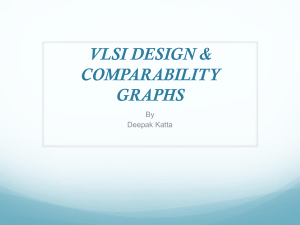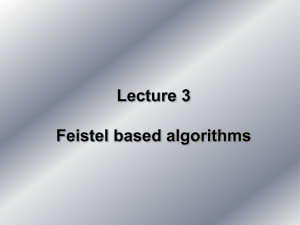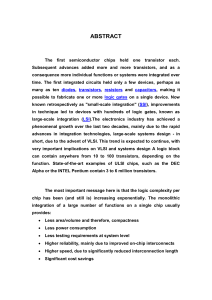Course description
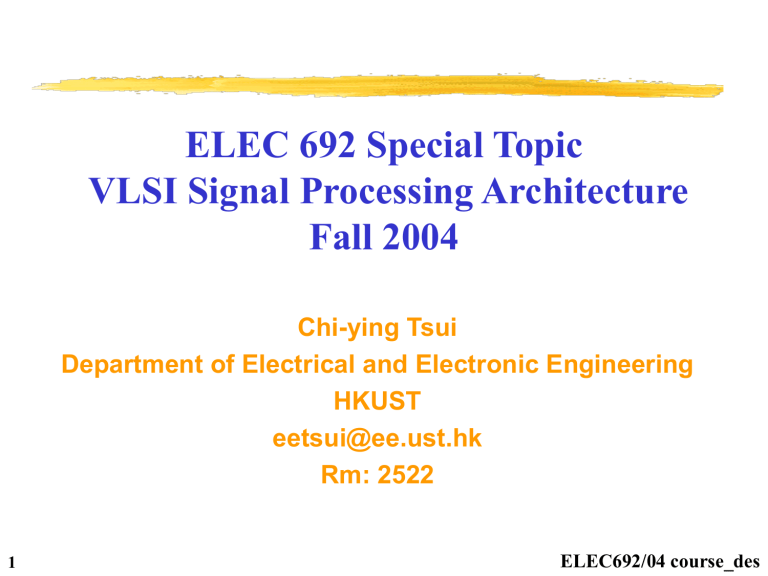
1
ELEC 692 Special Topic
VLSI Signal Processing Architecture
Fall 2004
Chi-ying Tsui
Department of Electrical and Electronic Engineering
HKUST eetsui@ee.ust.hk
Rm: 2522
ELEC692/04 course_des
2
Course Description
ELEC692 is dedicated for advanced Digital VLSI architecture for high performance and low power digital signal processing, particularly for communication and multimedia applications
General design and transformation techniques will be discussed for the optimization of the computation and architecture
– pipelining, retiming, folding and unfolding, and systolic array design will be discussed
– algorithmic/architectural tradeoff in power and performance will be studied
– example applications in video processing and wireless communication architectures will be provided.
Specialized Application specific VLSI Architectures will be discussed if time permits.
Extensive use of CAD tools and HDL modeling - Synopsys and
Cadence Tools
Design project
ELEC692/04 course_des
3
Course Objectives
This course reviews the design of VLSI architecture and design methodologies for digital signal processing for multimedia and communication applications. Application-specific processors and architectures to support real time processing of digital signals for different applications will be studied. Upon completion of this course, students will attain the following:
knowledge on designing high performance and low power architectures for different signal processing applications
methodology of designing VLSI implementation for different signal processing applications from the algorithmic level down to circuit level
understanding the algorithmic/architectural tradeoff for designing a signal processing applications
hand-on experience of using state-of-the-art CAD tools on designing such kind of architecture
ELEC692/04 course_des
4
Text and Reference Books
Major Text:
– K. K. Parhi, VLSI Digital Signal Processing
Systems: Design and Implementation,
John Wiley and Sons, 1999.
– P. Pirsch, Architecture for Digital Signal
Processing, John Wiley and Sons, 1998.
– Selected papers from IEEE Transactions and other Journals
ELEC692/04 course_des
Course Grading
5
Homework: 30%
– 3 to 4 written assignments
Paper project 25%
– Literature review on a special topic.
– Presentation and written paper are required.
– Individual project
Design project: 45%
– Group or individual project: Personal per group ~ 2
– Team work is important
– Design an architecture for a signal processing algorithm
– Tasks to be finished
• Specification: High-level model
• Logic Design: Synthesis and simulation
• Layout Design of critical block
• Verification - simulation for different abstraction level
• Final Layout of the chip (Optional)
• Performance estimation of the chip (Optional)
ELEC692/04 course_des
6
Lecture Outline
The course is delivered through lectures. The following topics will be covered in the course:
Introduction
– Overview on Typical Signal Processing Algorithms
– Overview of VLSI Architectures
– Basic signal processing kernel algorithm: digital filter, linear transformation
General signal processing architecture design techniques
– Pipelining
– Parallel Processing
General algorithm transformation techniques:
– Retiming
– unfolding algorithm
– Folding Transformation
– Register Minimization
ELEC692/04 course_des
7
Lecture Outline
Systolic array structure and design methodology
–
Mapping of algorithm to array structures
Low Power design of digital signal processing systems
Programmable digital signal processor architectures:
– Architecture and programming issues
–
DSP Processors for Mobile and Wireless Communications
–
Re-configurable computing using Field Programmable Gate Array (FPGA)
Signal processing arithmetic applications:
– Distributed arithmetic, CORDIC
– FFT/IFFT, DCT/IDCT
VLSI signal processing architecture for multimedia applications
–
JPEG/MPEG
–
Motion estimation architecture
VLSI signal processing architecture for communication applications
– Network processor architecture
– Digital modulation systems such as OFDM
–
VLSI architecture for channel error correction coding such as Viterbi decoder,
Turbo code decoder
ELEC692/04 course_des
8
Teaching Team
Instructor:
– Dr. Chi-ying Tsui(eetsui@ee)
– Tel: 2358-7071
– Office: Rm. 2522
– Office hour: Tuesday. 4-6p.m.
Technician (by email or appointment) :
– Mr. Jeff Lam(jeff@ee)
– Tel: 2358-8844
– Office: Rm: 3114b http://www.ee.ust.hk/~elec692
ELEC692/04 course_des
9
Assumed Background knowledge
Basic CMOS circuit theory and design technique
– resistance, capacitance, inductance
– MOS gate characteristics
– Different CMOS logic design technique
– Basic performance evaluation
Use of modern EDA tools
– simulation, validation (HSPICE)
– schematic capture tools (Cadence)
Logic design
– logical minimization, FSMs, component design
ELEC692/04 course_des
